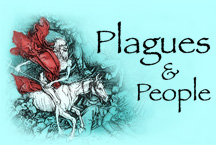
Infectious and Epidemic Disease in History
Department of History
University of California, Irvine
Instructor: Dr. Barbara J. Becker
excerpts from Syphilis (1530) by Girolamo Fracastoro (c.1478-1553) |

Department of History
University of California, Irvine
Instructor: Dr. Barbara J. Becker
excerpts from Syphilis (1530) by Girolamo Fracastoro (c.1478-1553) |
Urania, you who know the causes of things, who know the stars and the varied effects of the sky, and the realms of the air ... what causes brought this unusual plague to birth after so many centuries. Surely it did not come to our world carried over the western sea, in the period after the chosen band, putting out from the Spanish shore, dared to attempt the main and the unknown expanse of the wandering ocean and to seek out lands set in another world? For they say this kind of sickness has reigned in all the cities over there from the beginning of time bringing ruin, and through a perpetual fault in the heavens it wanders everywhere and spares few. Must we think then that because of commerce this contagion was imported to us, which, although small at the very beginning, later gradually gathering sustenance and strength, poured over all the earth in different directions? As often happens when a spark has fallen into stubble from a torch which a shepherd has carelessly left in the field, at first the flame is slight and it advances in desultory fashion: then, when by its movement it has gradually increased, it soars aloft, and triumphantly devastates the harvest fields and a neighboring grove and hurls its flames to the fiery heavens.... But in truth if what we have seen deserve faith, as is their due, we must not think this way: certainly it does not meet the facts to believe that the contagion is foreign to us and has been conveyed across the sea: seeing that in the first place we can show many who without touching anyone, with no intermediary, yet felt the effect of this same plague and have been the first to suffer. Besides a single contagion on its own could not have covered so much of the earth in such a short time. Behold it among the peoples of Italy.... Surely you see how the plague has raged over them all at one and the same time: how we have fulfilled one destiny together? What is more, they say that the nations outside Italy caught it for the first time simultaneously: ...the Spanish race, ... [the] Carthaginians, ... all you who reap the abundant harvests of Egypt, ... and you who lop the woods of palm-producing Edom. Since this is how things are, undoubtedly the beginnings of this ruinous disaster go deeper, the order of its events are more hid (if I am not mistaken) and it has ... a more important and majestic origin. In the beginning whatever Nature brings forth to life, either on the earth or in the lofty sky or in the mighty sea, do not all come forth with an identical lot nor by the same laws; but the majority, whose basic structure is made up of few elements, are created frequently and everywhere; yet others appear more rarely and only at fixed times or locations--their birth is more violent and their beginnings situated far away; and some before they break out of their darkness and night's gloomy prison drag out a thousand years and require the space of centuries.... Therefore, with diseases ... there is not one process of gestation for them all, the greatest number are easy to observe, they have an easy birth and their basic structure is obvious. Others emerge more rarely and only after a long period of time are they finally able to overcome the difficulties of their origins and a fate hard to unravel and deep darkness.... Of this kind is the dreadful plague which has lately come forth into the air and has finally freed itself from black mists and in a difficult birth burst its bonds.... [W]e must conclude that this plague has been seen on earth not once but often, although up to now it has not been known to us even by name.... Yet in the great ocean beneath the setting sun, where an unhappy race inhabits a world lately discovered [the New World], it arises everywhere and there is not a place where it is not commonly known. To such an extent can the causes of things and their initial development vary according to the sky and length of time. And that which over there the air and a suitable earth bear freely, here a long period of years has only just brought upon us.... [Y]ou must ... reckon that the seat and origin of the evil are firmly fixed in the very air, which pours in all directions round the whole earth, which infiltrates everywhere through our bodies, and is accustomed to send these diseases among the race of living creatures. For air is the father of all things and the author of their origin. This same element often brings serious illnesses to mortals, since its soft material has in many ways a natural tendency to putrefy, to be easily affected and to pass on the effects which it has received. Now hear the way in which the air has contracted contagions.... First then the golden red Sun, then all the stars bring change and disturbance to the earth, the liquid air and the sea's flat expanse: and as even in the sky the stars have changed their places and left their previous stations, so the mighty elements transform themselves in various ways. See how when Phoebus in winter has steered his speeding horses to the
south and views our world from a lowered altitude, winter is stiff and
hard with frost, it sprinkles the earth with rime and halts the wandering
rivers with frosty ice. This same sun, when, nearer to Cancer, he
looks on us from on high, burns the land; the groves and thirsty meadows
are parched and dry summer grows grubby in the dusty fields. Nor
is there any doubt but that night's splendor also, golden Moon, whom the
deep oceans and all the world's moistures obey, that Saturn's melancholy
planet and Jupiter's star, more kindly in his sphere, that beautiful Venus
and the fire of Mars and the remaining stellar bodies also change the elements
and influence them perpetually, and everywhere over a wide area cause great
movements: especially whenever very many of them have entered into
conjunction or deviating much from their course have kept to far different
paths. These events, to be sure, occur at intervals of very many
years and after many revolutions of the rapid heavens, the gods using these
means to revolve the fates.
Two hundred years have flowed since, as Mars combined his fiery light with gloomy Saturn, an unaccustomed fever [the Black Death] blazed forth through all the peoples of the Orient, through all the plains watered by the Ganges, which, after causing bloody sputum to be expelled from gasping lungs (a pitiful sight), reaching its climax on the fourth day destroyed its victims with a bitter death. That same fever attacked the peoples of Assyria and Persia, those who drink of the Euphrates and Tigris, and, a little while after, the rich Arabs and dissolute Canopus: then it infected the Phrygians, then crossing the sea unhappy Italy, and it raged all over Europe. Come then, now contemplate with me the constantly turning aether and the homes of the powers above and the burning stars, and driving your mind through all these places ask what was their position, what signs did the stars give, what did the heavens predict for our generation? For perhaps from this source all the origin of the new contagion and the preliminary course of this important event will be exposed to your view. It is the custom of the gods when the sun in its wanderings has passed through a fixed number of centuries for the fates to be decreed by Jupiter and everything laid out in order, whatever future events await the earth and sky. When this crisis was beginning to threaten our future, Jupiter, the supreme sower of all things and king of the powers above, ordered his associates in government to be summoned, Saturn and Mars: Cancer unbarred the double opening doors of the portals and opened the hall to the gods. They came together, whose care is to administer the fates. Active before the others was Mars, lord of war, shimmering with sword and flame, whose constant delights are battles, arms, revenge and slaughter rejoicing in blood. After him peacefully followed Jupiter the king, riding in a golden chariot, a father kind to everyone (if the fates did not prevent him). Finally, retarded by his long journey and years, the elder god [Saturn] approached bearing his sickle, who, always mindful of the old anger against his son [Jupiter] and refusing to obey his son, often even turned back and twisted round in his steps, threatening much, much offended in his cruel mind. 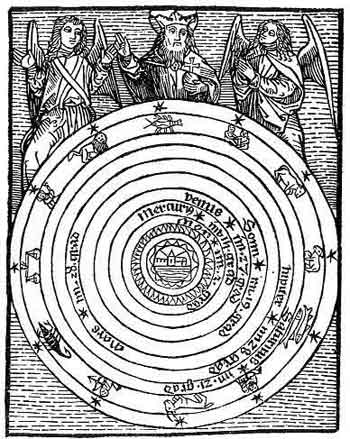
The Arrangement of the Universe at the Time of Creation, from Tractatus de pestilentiali scorra sive mala de franczos (1496), by Joseph Grünpeck But Jupiter from his solitary lofty throne on which he is accustomed to sit in state reviewed the fates and unraveled the future, greatly pitying the unlucky earth its troubles: wars, men's misfortunes, sturdy empires destined to fall, pillage, doors wide open to death, above all the new disease, a mysterious contagion, a disease not to be assuaged by any strength of human resource. The rest of the gods assented: Olympus shook and trembled, the aether was contaminated by a discharge from the new disease. Gradually the tracts of the air and wide space received the plague, and an unusual putrefaction came into the empty air and carried contagion over all the sky, either because, so many stars being in conjunction with the burning Sun, the fiery power attracted many vapors from the earth and sea, which, mingled with the thin air and gripped by this new corruption, then brought a contagion very rarely seen; or something else, sent down from the aether above, tainted the realms of the air far and wide.... Therefore seeing that contagions vary so much in nature and type and that there are many seeds, with fascinating characteristics, contemplate this one too whose origin is heaven. It burst into the air, a disease as marvelous as it was strange. It did not infect the silent creatures of the deep, the swarms of those that swim, nor birds, nor dumb animals wandering in high forests, nor herds of oxen or sheep or herds of horses, but out of all the species the one that is great through its mind, the human race, and it feeds, pasturing deep within our limbs. Moreover, from the whole of man this filthy disease seizes on that in the blood which is thick and dirty through its sluggishness, feeding on the rich slime. The disease and blood correspond in this particular way. Now I shall teach you all the conditions and symptoms of this sad contagion.... For perhaps in the future our descendants will find pleasure in reading them and in recognizing the plague's symptoms and shape. For a time will come again, by permission of the fates, as the years slip by, when the plague will pass away and lie sleeping deeply in black night: in turn after long centuries that same disease will rise again, and once more visit the heavens and air, and again some age to come will regard it with wonder. Meanwhile, however, those afflicted were burdened by an unusual lethargy and, feeling a languor with no apparent cause, performed their tasks with increasing, weariness and tried to keep themselves going although their whole body felt sluggish. Their natural liveliness fell downcast from their eyes, their color from their unhappy brow. Slowly a caries, born amid squalor in the body's shameful parts, became uncontrollable and began to eat the areas on either side and even the sexual organ. Then the symptoms of this defilement betrayed themselves more clearly. For as soon as the clean, kindly light of day had retreated and brought on the melancholy shades of night, and the innate heat, which at night usually makes for the deep internal parts, had abandoned the surface of the body, and no longer nursed the limbs now covered in a thick mass of humors, then the joints, arms, shoulder-blades and calves were tormented by intolerable pains. For when the contagion had passed through all the veins and had polluted even the humors and what was meant to feed the body, Nature whose wont is to reject what is harmful, attempted to expel the infected part from the whole body towards the surface. But because this matter with its dense substance was slow and by reason of its sluggishness tenacious, much of it clung, during its passage, to the nerves and muscles. Then as it spread it caused intolerable pains in the joints. This matter had a lighter element, more naturally inclined to erupt, which, as it was expelled, made for the surface of the skin and the limbs' extremities. Immediately unsightly sores broke out over all the body and made the face horrifyingly ugly, and disfigured the breast by their foul presence: the disease took on a new aspect: pustules with the shape of an acorn-cup and rotten with thick slime, which soon afterwards gaped wide open and flowed with a discharge like mucous and putrid blood. Moreover the disease gnawed deep and burrowed into the inmost parts, feeding on its victims' bodies with pitiable results: for on quite frequent occasions we ourselves have seen limbs stripped of their flesh and the bones rough with scales, and mouths eaten away yawn open in a hideous gape while the throat produced feeble sounds.... [W]here this disease holds sway a mucus usually flows all over the body: then at last it solidifies into an ugly scab. So someone sighing over the springtime of his life and his beautiful youth, and gazing with wild eyes down at his disfigured members, his hideous limbs and swollen face, often in his misery railed against the Gods' cruelty, often against the stars'. Meanwhile all the creatures on earth enjoyed the sweet slumbers of the weary and night's deep sleep: for the sufferers no rest was on hand, sleep had totally fled to the winds: for them Dawn as she blushed in her rising brought no pleasure: for them day was hostile, the night's apparition too was hostile.... Prayers were showered upon the Gods, incense burned in their temples and their altars were decorated with rich gifts. The Gods heard no prayers nor were moved by gifts.... Unhappy Italy, behold the end to which discord has brought your ancient virtue and your world-wide empire, an ancestral inheritance.... |
To begin with, since the blood when it is affected can be in different conditions, you should be more optimistic with this disease when it settles on uncontaminated blood; but for those whose veins are swollen with black bile and throb with thick blood there is in their case a greater struggle and the plague clings more tenaciously. Therefore it is worth your while to employ all your strong, sharp treatments against them and not spare the pitiful limbs. Moreover he can promise himself a future happier in every respect who has been able to detect it at the very beginning, quietly snaking through his guts bringing destruction. For when it has fed for a long time, and by long nourishment increased its strength, and the corruption has fortified its hold within the body, sad to say, only after a great struggle must you expect your freedom. Therefore you must spend all your effort on opposing its small beginnings, and store these rules in your mind to be remembered. Nevertheless, keep away from Venus, and above all things avoid the soft pleasures of lovemaking--nothing is more harmful. Beautiful Venus herself hates the contagion, the young girls hate it. [A]void rich duck, avoid goose, even harder to digest ... avoid quail, heavy and fat with cramming. Shun tender chitterlings, the belly of a pig curving with fat, and, alas, the chine of pig; don't feed on boar's loin, however often you have slain boars out hunting. Moreover don't let cucumber, hard to digest, nor truffles entice you, nor satisfy your hunger with artichokes or lecherous onions. I should not be happy with a fondness for milk, use of vinegar, frothing goblets of undiluted wine which has gathered smoke, like those which the hills of Corsica, the plains of Falernum and the fields of Pucinum send; or those which from our hills the small-berried Rhetic grape supplies. Certainly I should be happier with Sabine wines and those which earth produces ready-diluted and the Naiads have subdued with ample draughts from their streams. But if food from gardens and the tables of the gods are to your mind and the simple unbought delights of vegetables, there is no lack of green mint and abundant sisymbrium, endive and sow-thistle which thrives in the depths of winter and water cress which always delights in the brooks of springs, and sweet savory and scented calamint. Happy teeming balm and borage are plucked from an irrigated garden, and rocket proliferating with full shoots and cabbage and sorrel and the leaves of salty samphire. Even the thorn bushes will have produce, hops; from these gather their first shoots, from these gather the shoots of the white bryony when it has not yet unfurled its branches, has not yet woven a shady arbor and bidden its green clusters hang down.... When over the course of very many days you have first strained off a decoction from these plants and boiled out all the raw essence, then medicate it with fierce squill and bitter gourd and severe hellebore, and the plant which, rising on the shore where the wave of the sea plays, changes its color three times a day, changes its flower three times and marks the fact by its name, a plant with a powerful root. To this add the required ginger; add also wild snaky cucumber and incense from Nabataea, add myrrh and bdellium and ammoniac gum and tear of All-heal [Panacea] and autumn crocus with its sweet bulb. When this is done, if by chance your heart goes cold and your spirit is unmanned and you decide not to try painful means straightaway and extinguish the pestilence quickly, but to employ gentle agents and use mild procedures over a period of time, then you are left with abandoning the cure and turning your attention to fomentations and to the fine seeds of the invisible contagion, those whose habit is to snake inside the body in astonishing ways. So then all the substances which dry, and because of their resin usually withstand stinking putrefaction, will prove of benefit. Such are drops of myrrh, such are incense, cedar, aspalathus and undying cypress and galingale fragrant with its scented reed. Don't forget cassia, don't forget cardamon, or macir or aloes or cinnamon. Even in the meadows and near marshes there is the famous scordium which usually puts up such a powerful resistance against every kind of poison and contagion, a herb which can be discovered with little trouble. The plant, when its greenery shows, mimics in its leaf the water germander; it has a red flower and recalls by its name the taste of garlic. At early Dawn boil its hairy leaves and roots and wash yourself out with copious draughts.... Some have discovered how to heat in hollow glass vessels with elongated necks and bellies which swell out in globular shape, either ivy leaves, or bundles of dittany from Mount Ida, or Illyrian iris, or the black root of hartshorn, or elecampane; all the vapor which is released is borne aloft and being fine fills all the empty places. But where it encounters the glass, cold from the outside air, the moisture collects and condenses into watery drops: and runs down in wandering streams through open channels. They order a cup of the distilled liquid to be drunk at the first light of the morning star, and the use of blankets to bring on a sweat; certainly it is not without effect; it has a power helpful in dispersing into thin air the remains of the disease. Meanwhile, if a malicious pain convulses and tortures your limbs, hasten to soothe the pain with greasy wool and mastic oil; to this you can add clammy goose fat, thick oil extracted from linseed, narcissus, elecampane, clear runny honey, and you can put with them crocus from Corycus and oil lees which cost you nothing. But, if a nasty herpes has gnawed away at your throat and mouth, dab it with soda and pure water medicated with verdigris: burn out the nasty seeds and slay the crawling serpent plague. But you will not be able to destroy the sores by any other aid than that of caustics to which you ought to add something fatty to convey the drying agents within the body. These will also have the force to remove ulcers feeding anywhere on the pitiable limbs, and soften indurations which are firmly set. There are some who first of all heap together styrax, red mercuric sulfide and lead oxide, antimony and grains of incense, with whose bitter fumes they envelop the body entirely and destroy the deplorable disease, the dreadful contagion. But the treatment is not only severe and fierce but also treacherous, since the breath chokes right in the throat and as it struggles free only with difficulty supports the ailing life; therefore no one in my judgment should dare to use it over the whole body; perhaps it will be useful for particular limbs on which the ugly pustules and Chironian ulcers feed. The majority prove more successful by using quicksilver to loosen everything completely; there is a miraculous power implanted in it. Whether because it is its nature to take up cold and heat instantaneously, so that it quickly gathers our body heat to itself and, because it is very concentrated, it breaks up the humors and acts on them with greater force, just as a white-hot flame makes iron glow more fiercely. Or the fierce particles, from which mercury with its marvelous structure is formed, are loosened from their own internal bonds and connections and, now able to be carried separately into the body, they melt the concretions and burn out the seeds of the plague. Or the fates and nature have given it another power.... Don't consider it repulsive nor disgusting to smear and cover the whole body; by such means the disease is removed, and nothing could be more repulsive than it. Yet spare the head and avoid the soft parts before the heart. Then on top bind bandages tightly and fasten dressings made of tow; next put yourself in bed with many blankets, until you sweat and the filthy drops flow over your body. It will be enough for you to have repeated this for ten days. It will be hard: but whatever the treatment brings must be borne. Be bold in spirit.... |
In the great Ocean, beneath the blazing star of Cancer, where the sun hides when it is already midnight with us, an island lies, unknown till this time, of vast expanse. The race which discovered it gave it their family name of Spain; the land is fertile in gold, but made far richer by one tree--they call this in the sounds of their native speech Guaiacum. |
|
The tree itself is smooth and being huge spreads from its high top a huge canopy ever green, tresses of arbute leaves ever in place. Its nut, which is small but bitter, hangs down from the branches and clings to the leaves in great quantities. The tree's timber is difficult to master, the wood is almost like hard iron; when burnt it exudes a sticky resin. The color of a dissected piece is complex. On the outside bark it is smooth and green like laurel; the next layer is pale like box; but the middle is dark brown with a hint of black, a cross between walnut and ebony. If it were red next then it could equal the rainbow with its varied colors. That foreign race adores this tree and is very eager in its efforts to rear it: with this the hills and open plains far and wide, with, this every field is clothed: nor is anything more sacred to them or of more important use; for all hope lies in it against this plague which the heavens have there made eternal. |
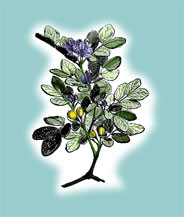
Leaves, flowers and nuts of the Guaiacum |
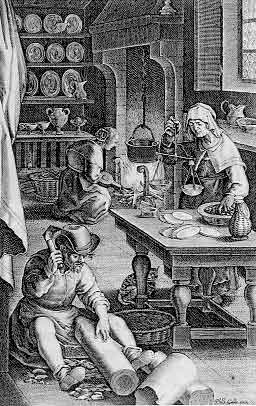
Decocting guaiacum |
Casting away the bark they beat the strong branches with great force
or they file them into minute particles and they lay these in the fountain's
pure water, until the moisture has been absorbed by the powdered wood for
a day and a night while steeping. Then they cook it and they wear
themselves out in their efforts to prevent the force of the water, enraged
by the fire, from bursting out and hurling its overflowing foam on to the
flames. For with this froth they anoint any abscess there is anywhere
on the body, any sore which is eating away the diseased frame.
When half of the divine liquid has been absorbed they store whatever is left. But they cook, as before, the particles which have been left, adding sweet clear honey. This you should note is the one drink which the very law of the race commands and the priest recommends should come to the table. But they take draughts of the first decoction, the liquid which has been put in store, twice a day.... |
Nor do they stop drinking this until the moon has fulfilled her course, the whole of her circuit in her monthly wandering, and again met her brother's steeds in rivalry. Meanwhile they conceal themselves in their dark sanctuaries where neither the wind's force, nor any breath of air can wind its way and where there is protection against cold blasts. A marvelous feature also which I should above all mention is the slender diet and the great fasts they impose on themselves. For it is usually merely enough to keep the body itself nurtured and life maintained and just prevent the limbs from wasting away. Do not, however, ah do not fear these great trials; immediately that sacred draught, like ambrosia, restores and nurses your strength and the fasting limbs allow it to carry nourishment into the secret places. For two hours, no more, after they have drained the nectar they put themselves to bed to allow the medicine to penetrate more copiously and from a warm body draw sweat. At the same time the plague vanishes into the vacant air, and astonishing to say blisters no longer appear; and now all the ulcers are gone, now the pain has gone, leaving the limbs strong, and youth in its first flower returns; and now the new moon comes back having traveled its circuit. |
||
| [Spanish sailors after many misadventures and hardships reach the shores
of Ophyre. (Ophir was a distant and exotic place mentioned in biblical
accounts of King Solomon's reign. Reputed to be a gold-laden paradise,
it was believed by some, including Columbus, to exist in the New World.)]
Meanwhile from the forests a race with black faces and black hair ran and gathered round our ships, a strange throng of men, unarmed, all with naked breast, all bound with garlands signifying peace; as they marveled at the tall ships with their massive structure, at the men's garb and flashing arms, they could scarcely have their fill: and, unsure whether these beings sent from the sky were men or heroes or powers divine, they greeted them with rites of adoration and with prayers; before the rest the King himself to whom they brought joyful gifts, gold collected from the river banks and presents of corn, fruits of their native country and clear honey. They were given in return clothes of ours and many presents, and entertained with wine they mixed new pleasures, like some mortal admitted to the tables and feasts of the Gods with promise of a happy future draining celestial cups of eternal nectar. When then by a treaty of friendship both sides confirmed their carefree minds and commerce was held with the natives, the kings also happily joined hands, embracing one another on the shore, confirming the treaty.... And now the peoples mingled and were received as guests, the Spaniards in hut and hall, the natives in the lofty ships; they spent the days drinking, in sport and joys unrestrained. It so happened that a feast day occurred in the locality and they were preparing to perform annual rites to Sun the Avenger in a shady grove. The whole band, Spaniards and people of Ophyre, had assembled. Here in a hollow valley, on the grassy green of a bank, a great number of folk stood, set apart, mothers and their menfolk milling together, the masses and the aristocracy, boys and old men, all with melancholy hearts and hideous bodies, scaly with scabs, flowing with pus. As they milled around, a priest in white robes cleansed them with purifying waters and with a branch of leafy Guaiacum. Then before the altars he slaughtered, according to custom, a snowy bullock and he sprinkled a shepherd nearby with blood from the slaughtered beast, scattering the drops from a libation bowl, and he chanted in measured rhythm a hymn for deliverance to the powerful Sun, and the rest of the crowd followed, and offered up pigs and sheep and feasted upon the grass on entrails roasted round spits. The race from Europe stood amazed both at the rites of the ceremony and at the contagion seen nowhere else at any time. But their leader ... wanted to know of the native king (since by now they had a common speech and means of talking) to which of the gods the solemn rites belonged; why there was such a large miserable crowd of languid people at the bottom of that deep valley; why was the shepherd near the altar amid the sacrifices sprinkled with the blood of the slain bull. In reply to him the King said, "O most valiant hero of the Spanish youth, these are our people's rites, we celebrate these ceremonies each year according to custom in honor of God the Avenger. They have an ancient origin, the fathers of our fathers performed them long ago. But if you like to hear of foreign customs and men's sufferings I shall reveal from their primeval origins the basis of these ceremonies and the very beginnings of this miserable plague.... "We too are said to have issued from ... a happy race dear to the gods--as long as our good ancestors continued to worship heaven and acknowledge what they had received from the gods. But after the divine powers began to be held in contempt through the luxury and pride of their prodigal descendants, I could scarcely ever encompass by my speech the nature and magnitude of the troubles which subsequently attended the wretched people. Then the island, called Atlantia from that venerable first king, collapsed, shattered by a huge earthquake, swallowed up by the ocean.... From that date cattle and four-footed creatures of great bulk perished forever, never to be restored at any time.... Then also this unmentionable pestilence, which you see feeding on our bodies, which none of us or, to be precise, few avoid, sent down from heaven because of the gods' displeasure and Apollo's anger, rages violently against all our cities. Consequently our fathers instituted this sacred festival with their strange rite, whose origin is said to be as follows--
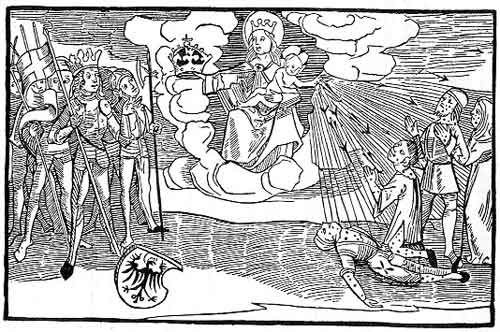
The Virgin Mary offers a heavenly crown to the righteous crusader, Emperor Maximilian. Is the infant Jesus (like Apollo in the Tale of Syphilus) showering sinners with deadly arrows that afflict them with the dreaded Pox? Or, is he sending down benevolent healing rays to cure them? Or, perhaps, both??
"All that helpless and pitiable crowd which you discern have been afflicted by God, and they pay for the sins of their ancient forefathers. For them by vows and holy prayers and song the bardic priest reconciles the gods and Apollo's anger. Purified they bring great boughs and the strong wood of the holy tree to their homes: with offerings of this by its marvelous force they drive away the contagious influence of this unspeakable disease." |
||
With these and other stories, covering many topics, the peoples who had mingled together from opposite parts of the globe whiled away the time. Meanwhile the ships which had been sent back to Europe's loved shores ... brought [back] astonishing news: widely ... this same contagion was spreading in the sky of Europe, and harassing cities dismayed by lack of remedies. Indeed a more serious rumor ran through all the ships, that the fleet, and no scant number of its youth, were in the grip of this same illness, all their limbs wasting away.... So ... they prepared to collect branches from the virgin forest and pieces of trunk from the lofty grove and took up cups of the medicine according to the native rite; by this favor they finally repelled the savage contagion. Moreover not forgetting their homeland they ordered ... this blessed tree to be brought to our shores, in the hope perhaps of repelling the kindred disease from this clime.... 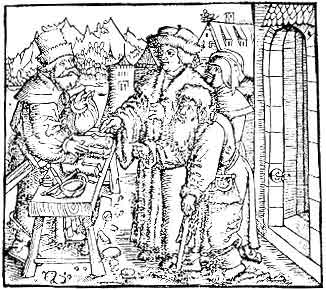
Buying and Selling Guaiacum (1519) You were the first, Spaniards, to receive the favors of the gods, marveling at the help on hand. Now Guaiacum is known to French and Germans and Slavs, it rejoices in the world of Italy, it has now already been carried into every part of Europe. Hail great tree sown from a sacred seed by the hand of the gods, with beautiful tresses, esteemed for your new virtues: hope of mankind, pride and new glory from a foreign world; most happy tree, if only the holy powers had wished you to have been born under our heaven and to grow amid this race of men belonging to the gods, sacred with everlasting wood. |
 |
| Go to: |
|
|